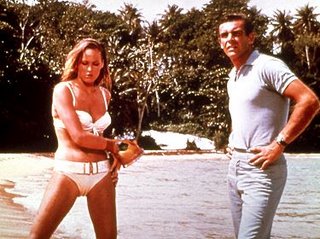
I like it when a movie lives up to expectations.
A flick doesn’t even have to be all that great, as long as I know going in that I shouldn’t expect greatness.
That’s what keeps me coming back for the X-men movies; they aren’t the greatest ever, but they are consistently at least as good as I expected them to be.
I go in expecting some fluffy fun, and I always have fun.
The latest installment in the X series is no exception.
“X-Men: The Last Stand” delivers plenty of super-powered action, with just enough character development and political commentary to keep my brain from shutting off entirely.
Picking up where the last film left off, “The Last Stand” starts with Wolverine (Hugh Jackman) and Cyclops (James Marsden) both seriously bummed about the death of Jean Grey (Famke Janssen) when that lake collapsed on her at the end of X2. When Grey comes out of the lake seemingly intact, however, the celebration is tempered with anxiety. Professor Xavier reveals that the mild-mannered hottie has always carried within her a second personality: a horny, destructive id of a telepath who calls herself Phoenix. Sure enough, the lady who rises from that lake is the Phoenix, and she turns out to be the most powerful mutant ever. Needless to say, telekinetic hell breaks loose.
Meanwhile, the mutant-related political hoo-ha continues, as the government develops a cure for mutant genes. Suddenly the political jargon changes, and mutants aren’t described as a threat but as people with a disease who need to be “helped.” This splits the mutant community into three factions. Some, like Rogue (Anna Paquin), whose essentially useless mutation causes her to uncontrollably suck the life out of anyone she touches, see the cure as an opportunity to be normal. Magneto (Ian McKellen) on the other hand, is predictably enraged at the notion that mutants need “curing,” and he finds plenty of new mutant allies who agree. Professor Xavier (Patrick Stewart) and his crew continue to hold the middle ground, working with mutant diplomat Beast (Kelsey Grammer) to ensure that mutants retain individual freedom of choice in the matter. It all naturally builds to a big good-mutant/bad-mutant/human battle with tons of bloodless violence.
Naturally, this disease-versus-alternative-lifestyle debate on mutantism raises parallels to the real-life plight of gays in America. It’s not just gays, though. The mutants are an allegory for anyone pressured to assimilate with the majority while trying to maintain his or her own identity.
Believe it or not, there’s even more food for thought in this popcorn flick. The complex Magneto, played with panache and subtlety by Ian McKellen, is my favorite in this series. A childhood survivor of the Jewish Holocaust, he is merciless because he was not shown mercy. His character demonstrates that there are two ways a strong person can respond to being oppressed. He can determine that oppression is wrong and vow to fight it, or he can decide that oppression is inevitable and resolve to be on the winning side next time. Magneto has taken the latter course, and the X-men series is courageous enough to allow just a little ambiguity about whether Magneto is completely wrong.
“The Last Stand,” stumbles here and there, particularly in the more emotional scenes. In one particularly verklempt scene, which takes place after a major tragedy, the X-men almost decide to give up and shut down the mutant school. In after-school-special fashion, they find the inner strength to give it their all and make a last stand! It’s almost unwatchable, folks. The scenes of teenage puppy-love are also a bit tough to take. They should have shortened those scenes and used that time exploring the Phoenix character and having her make out with Wolverine in her underwear. Just my opinion.
Other than those weak points, “The Last Stand” delivers all it promises. I’m sure that fans of the comic books could find more to quibble over, but for the rest of us, this is good, solid entertainment. I’ll be back for the next sequel.
4 stars out of 5.

















